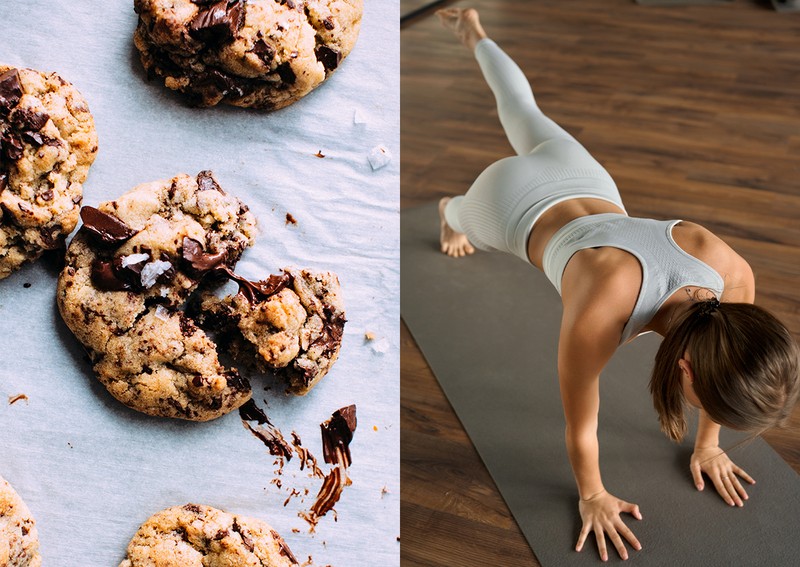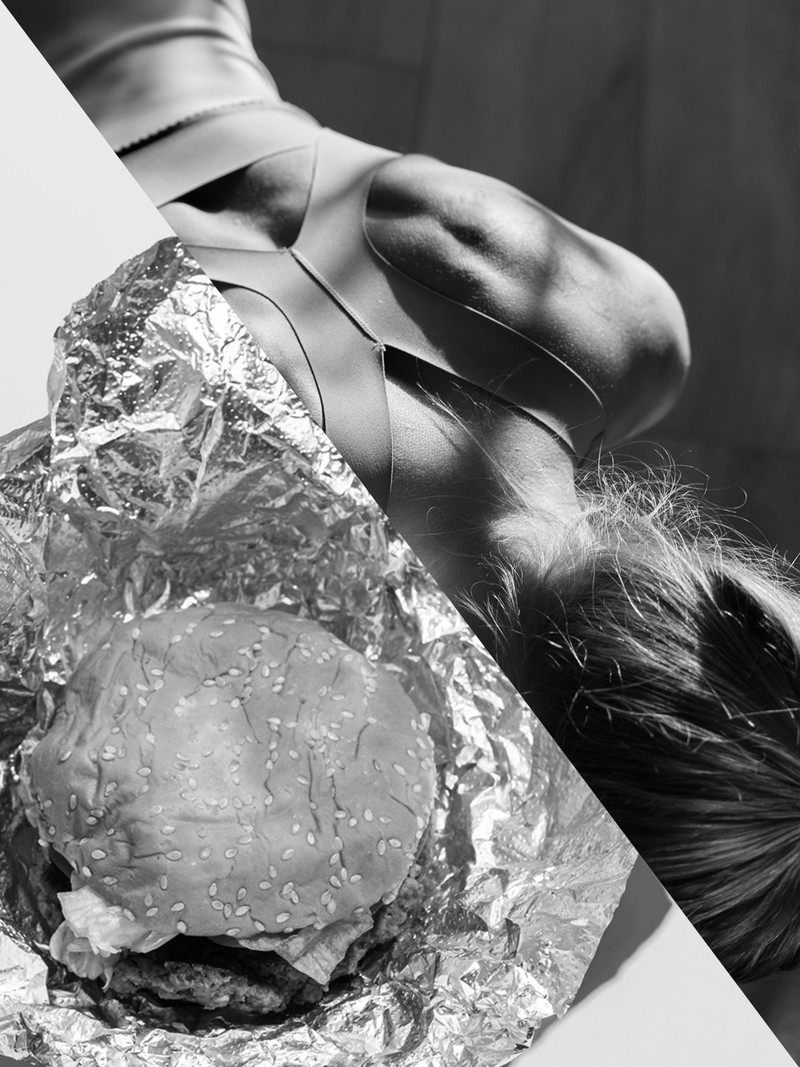Can You Out-Exercise A Bad Diet?
Can you explain the concept of ‘out-exercising’ a bad diet?
“Out-training a poor diet is a concept many of us wish was true, but there’s more to maintaining a healthy body than calories in, calories out. It refers to the concept that you can eat whatever you want, whenever you want, and however much you want, and still maintain a healthy weight and body composition because you exercise regularly. Michael Phelps – the Olympic swimmer – famously used to consume 10,000 calories a day, including a serious amount of junk food, and still retained an impressive physique, but for non-athletes who aren’t blessed with incredible genetics or a lightning-fast metabolism, or who aren’t training with Olympic-like intensity, you simply can’t out-train a bad diet. Simply put, if you’re consuming more calories a day through food – particularly processed food that’s high in sugar – than you’re burning through exercise, then no matter how hard, or how often, you train, you’ll never lose weight.” – Mark Bohannon, certified PT at Ultimate Performance
How do calories factor into the equation?
“Whether you’re looking to maintain your weight or lose a few pounds, there’s more to it than calories in, calories out. The quality of your calories matters and not all calories are equal. For example, a day’s worth of calories from lean, whole foods will have a dramatically different impact on your weight and health than 1,500 calories of processed junk food. A diet rich in lean protein, wholegrains, vegetables and healthy fats will give your body the nutrients it needs to thrive. When you eat a clean, wholefood diet, you’re naturally able to better manage your weight as these foods improve digestion, support a healthy metabolism, suppress inflammation, improve cognitive function, keep your thyroid ticking, and aid deep sleep – all these factors will enhance performance and strength in your workouts.” – Mark Bohannon
What are the consequences of not properly fuelling a workout?
“Exercise causes a build-up of free radicals in the body. Free radicals are naturally produced by the body, but when they’re produced in higher amounts, they can interact with other molecules in the body and cause damage to cell membranes and even DNA – this damage is known as oxidative stress. If left unchecked, oxidative stress can contribute to various health problems, including inflammation and premature ageing. Moreover, trans fats and processed foods can trigger free radicals to rampage around our bodies. On the other hand, a balanced diet rich in antioxidants will counteract damage caused by exercise-induced free radicals, keeping the body healthy.” – Mark Kelly, PT & CrossFit trainer
What dietary habits counteract the benefits of exercise?
“Overeating is one of the most common pitfalls I see clients making. Over the years, we’ve become addicted to the feeling of having a full stomach. By doing this, you’re not only over-consuming calories, but you’ll soon find no amount of exercise will be able to offset the inevitable weight gain. Portion control is also critical. As a PT, I’ve learned to adapt to the feeling of always being a little bit hungry to maintain a healthy weight – it’s a good, effective habit to adopt. Having the odd treat here and there is part of a healthy lifestyle but shift your mindset away from ‘good’ and ‘bad’ foods, and think more about the volume of food you’re consuming. A couple of chocolate biscuits now and then won’t do any harm, but half a packet every day isn’t a sensible idea. At the same time, avoid rewarding yourself at the weekend for ‘being good’ in the week. This usually involves a blow-out with copious amounts of alcohol and junk food with a calorie count in the thousands. This pattern of eating will completely undermine your fitness regime because all those excess calories will add up and you will gain weight, no matter how hard you exercise.” – Mark Bohannon
Are some forms of exercise superior to others when it comes to weight management?
“If you are trying to lose weight, lift weights or use resistance bands – this will build muscle mass and allow your body to burn more calories at rest, as well as improving your muscle-to-fat ratio. Circuit training that combines both cardio and resistance training is also a great way to build strength and endurance and raise your metabolism. HIIT, meanwhile, is a great way to improve insulin sensitivity.” – Mark Kelly
The bottom line?
“Exercise and nutrition go hand in hand. You can’t be in peak health from just a good diet alone, and you can’t be healthy by exercising if your diet is poor quality. Our bodies were built to move. Movement improves blood circulation and supports the lymphatic system, which cleans the blood and filters toxins from the body. Plus, mitochondria – the powerhouse cells in our body – rely on aerobic respiration to function properly. Exercise is also scientifically proven to reduce symptoms of depression, reduce your risk of heart disease, improve insulin sensitivity and increase muscle mass and bone density, which decline as we age. It can also regulate blood pressure and speed up metabolism – if you’re not staying active, or not fuelling your activity properly, you’re missing out on these benefits and more.” – Mark Kelly

Here, the experts share their top tips for striking the perfect balance between nutrition and exercise
Fuel Your Body
“Without the right nutrients, you won’t have the physical endurance to push through tough workouts, and you’ll lack the nutrients needed to recover properly, meaning it’ll take you longer to see results. You’re far better off eating better-quality carbs, prioritising protein and paying closer attention to the time windows in which you eat to keep your digestive system functioning well and nutrient absorption optimal.” – Ruth Stone, PT at Sweatband
Start The Day With Protein
“If you struggle to maintain your weight despite regular exercise and relatively healthy eating, switch up your breakfast. If you typically start the day with cereal, toast or white carbs, swap this for foods rich in protein, like eggs, a protein smoothie, or protein overnight oats. This will make a dramatic difference to your blood sugar levels, giving you more energy for the day ahead and keeping you fuller for longer.” – Mark Bohannon
Swap Cardio For Strength
“Cardio may burn more calories than other forms of training, but it’s strength training that alters your fat ratio and enhances metabolism. The problem is a 45-minute run will burn more calories than 45 minutes of strength training, but there’s more to it than the calories you burn in that session alone. The more strength training you do, the more you will tone and change your body’s shape – as well as increasing bone density.” – Ruth
Cut Back On Sugar
“Foods high in refined carbs and sugar can wreak havoc with your blood sugar levels. When you eat a sugary food, the pancreas releases insulin to remove excess sugar from the bloodstream, and store it in the liver, muscles and fat cells for future use as a fuel source. When our blood glucose levels are consistently high, the body’s response to carbs changes, and high levels can prevent the body from breaking down fat, blocking the body from using fat as an energy source. Eating a diet rich in whole foods will ensure insulin is regulated to optimise fat loss.” – Mark Kelly
Don’t Rely On Your Fitness Tracker
“If you’re someone who lives by the stats on your fitness tracker, you may be doing yourself a disservice. Say, for example, you’re a keen long-distance runner, or you’re obsessed with a certain spin class. Yes, the body will burn calories, but the body also has a clever way of adapting to patterns and cycles. If you run regularly, for example, your body will adapt to how it needs to better expend calories. Your body learns how to manage your routine to better use its energy. This ultimately means that you may not burn as many calories as you think during an intense workout.” – David Wiener, training specialist at Freeletics
For more from the experts, visit UltimatePerformance.com, Sweatband.com & Freeletics.com.
DISCLAIMER: Features published by SheerLuxe are not intended to treat, diagnose, cure or prevent any disease. Always seek the advice of your GP or another qualified healthcare provider for any questions you have regarding a medical condition, and before undertaking any diet, exercise or other health-related programme.
DISCLAIMER: We endeavour to always credit the correct original source of every image we use. If you think a credit may be incorrect, please contact us at info@sheerluxe.com.


